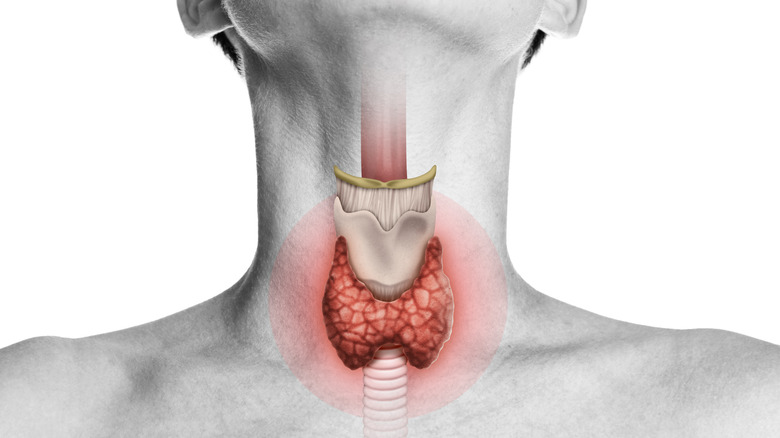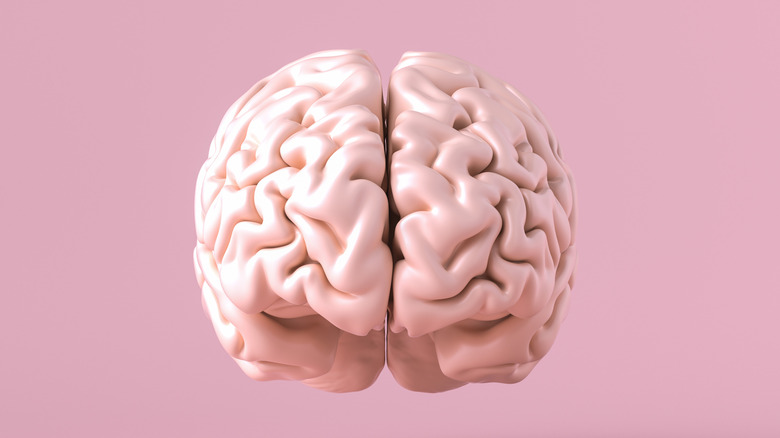13 Sneaky Reasons You Missed Your Period
So your period is late, you took a pregnancy test and it's negative — now what? While many period-havers might be worried in this circumstance, there actually may not be much to stress about. It can be quite common to miss a period once or twice, even if you are on birth control (via Medical News Today). Typically, a menstrual cycle happens every 28 days, but they can range from 21-40 days, according to the National Health Service (NHS). And it's actually common to skip periods for the first couple years when you start your menstrual cycle (via Nemours KidsHealth), as well as during menopause (via Banner Health).
But if you've been dealing with Aunt Flow for years and are sure you're not pregnant or going through menopause, you might experience a missed period for a variety of different reasons — some of which are not a cause for concern. However, there could be some serious underlying health issues causing it, so it's important to figure out what may be happening. If you are feeling anxious, there's no harm in visiting your doctor to get a checkup. According to Penn Medicine, you should especially schedule a doctor appointment if you haven't had a period for three months, you begin having a cycle longer than every 35 days, or your period becomes irregular all of a sudden.
Stress
Stress: These days, we are so familiar with this word we might not really take it seriously, or worse, we've just gotten used to it. Everyone reacts to stress differently, and what someone finds extremely stressful, others may not even be phased by (via WebMD). Our bodies can biologically handle acute stress, but chronic stress is a different story. Stress can be so deeply rooted in our daily lives that we often may not even realize it's there until our body gives us a wake-up call. Stress can manifest in your life in many different ways, and can look differently depending on the individual; even including physical symptoms like headaches, upset stomach, insomnia, anxiety, and menstrual cycle issues.
Stress can be emotional, mental, or physiological, like going through a break-up, moving to a new state, or getting sick. All of these things could cause a missed period (via The Society of Obstetricians and Gynecologists of Canada). Long-term stress can cause hormone imbalance and affect parts of your brain like your hypothalamus, which helps regulate your menstrual cycle (via Healthline). It's important to incorporate stress-relieving activities in your life, like exercise, yoga, meditation, art, reading, or dance (via The American Institute of Stress) — find something you love and make it a part of your daily schedule.
Being underweight
Being underweight can actually affect your menstrual cycle, causing a lapse in your period (via Women's Health). This is because body fat helps to store estrogen, and if you don't have enough body fat, you won't have enough storage space for the hormones that help regulate your menstrual cycle. "We need a certain level of fat to maintain a pregnancy, and if this falls below our own particular set-point, our pituitary gland will stop instructing our reproductive organs to produce the hormones needed for menstruation," says nutritionist Melanie Brown to the publication. In addition, if you're trying to get pregnant, it's important to note that being underweight can also mess with your fertility — whether you're having regular periods or have skipped a period. Low body fat can decrease the potency of your reproductive hormones, reducing your chances of getting pregnant.
To find out if you are underweight, you can calculate your body mass index (BMI) on a BMI calculator online tool. Typically, women that have a BMI less than 18.5 are thought to be underweight (via U.S. Department of Health and Human Services).
Being overweight
Being overweight can also have a negative impact on your menstrual cycle. While being underweight means your body may produce low levels of estrogen, being overweight can lead to an overproduction of it (via Healthline). This surplus of estrogen can lead to irregularities in the menstrual cycle, impacting how often you get your period, or even stopping your cycle completely (via NHS). Scientific research studies confirm that being overweight is linked with irregular menstrual cycles (via Heart). Another research study suggests that being overweight can also contribute to heavy menstrual bleeding and other menstrual cycle complications (via Journal of Endocrinology).
Calculating your BMI can help you to figure out if you are overweight or not, but that doesn't necessarily mean that is the one and only cause of your missing period. Your doctor should be able to help you determine if being overweight is a contributing factor to an irregular or missed period.
Polycystic ovary syndrome (PCOS)
Polycystic ovary syndrome (PCOS) is a health condition that can affect your hormonal balance and menstrual cycle (via Healthline). PCOS occurs when your body overproduces androgen, which can lead to cysts growing on the ovaries. This can result in an irregular menstrual cycle, missed periods, or even a halt in the cycle altogether. PCOS can also affect other hormones in the body, like insulin.
The cause of PCOS is unknown, but some contributing factors could be an overabundance of insulin, low-grade inflammation, or genetics (via Mayo Clinic). Being overweight has also been linked with PCOS and can amplify symptoms. Some complications of PCOS are infertility, gestational diabetes, miscarriage, type 2 diabetes, sleep apnea, depression, anxiety, endometrial cancer and other serious health conditions. Therefore, if you've missed several periods or have an irregular cycle, it's important to visit a doctor who can help you test to see if you have PCOS.
Birth control
You can miss your period even while taking birth control (via Healthline). In fact, spotting, lighter bleeding, or a skipped period might even be normal or expected with certain birth control types. When taking birth control pills, if you forget to take a dose or miss one — hey, accidents happen — irregular bleeding or spotting can occur. If you know you haven't missed a dose and you experience a missed period, try to not freak out, as pregnancy may not be the cause. The culprit is more likely the hormones in your contraceptive pills.
Some methods of contraception, like the progestogen-only pill (POP), injections, and intrauterine devices (IUD) — especially the Mirena — can stop periods from happening altogether (via NHS). In addition, starting or stopping birth control can alter your cycle, causing irregularities or missed periods (via Healthline). Most birth control methods inhibit your body from ovulating, so when you get off birth control, it can often take up to three months for your cycle to steadily return.
Extreme workouts
Exercise is good for your health, but sometimes too much of a good thing can be a bad thing. A strenuous workout routine can leave you feeling exhausted, depleting your body's energy reserves and ability to keep all it's systems up and running smoothly (via Healthline). Plus, intense exercise means you will likely be burning more calories then you're consuming, which can cause hormonal imbalance and an irregular menstrual cycle. This is commonly seen in athletes and sports professionals that train for several hours every day. In addition, extreme workouts can cause intense stress on your body and can result in losing too much body fat, both of which can cause irregular cycles or skipped periods (via NHS). This can often be remedied by decreasing your workout intensity or increasing the amount of calories you consume, but it's best to check in with a medical professional to see which steps are best for you.
Perimenopause
Perimenopause is the term for the several years in your life leading up to menopause (via Healthline). Perimenopause typically lasts anywhere from four months to four years until menopause sets in, which marks when you officially stop getting your period. Oftentimes, missing a period is one of the first indications of perimenopause, since an irregular cycle is quite common during this time. In fact, it's common to experience hormonal shifts in your 30s and 40s, eight to 10 years before menopause sets in and even before perimenopause. Estrogen levels typically drop or fluctuate during perimenopause, leading to irregularities in the menstrual cycle (via Healthline). These hormonal changes could cause a missed period. Some signs of perimenopause include irregular periods, lighter or heavier periods, increased premenstrual syndrome (PMS) symptoms, tender breasts, weight gain, hair changes, heart palpitations, headaches, change in sex drive, trouble concentrating, forgetting things, body aches, urinary tract infections (UTIs), and fertility issues.
Early or premature menopause
Early signs of menopause may be causing you to miss your period. Menopause is diagnosed when you don't get your period for at least 12 months straight. It typically happens to those between the ages of 45-50 (via National Institute on Aging); however, it is possible to get menopause at an earlier age, which can lead to unexpected irregular or missed periods. If you experience menopause before age 40, it's commonly referred to as premature menopause, and if you get it between 40-45 it's called early menopause. Only 1% of women experience premature menopause, while 5% get early menopause (via Cleveland Clinic). Your chances of developing early menopause increase if you are a cigarette smoker or are taking some types of medications or treatments (via U.S. Department of Health and Human Services). Early and premature menopause share the same symptoms as regular menopause, so if you're in your 30s or 40s, it's something to keep in mind.
Thyroid issues
Your thyroid is a gland in your neck that releases the thyroid hormone, which controls and regulates many important bodily functions, like your metabolism and menstrual cycle (via U.S. Department of Health and Human Services). When your thyroid isn't working properly, it will release either too little or too much thyroid hormone, resulting in many imbalances. Some of the most common signs of thyroid issues are feeling tired, exhausted, and restless, paired with unexpected weight gain or weight loss — which can also be symptoms of stress from every day life, so sometimes it can be hard to tell if it's your thyroid to blame. There are a couple different common thyroid conditions: hypothyroidism is when your body isn't producing enough thyroid hormone, and hyperthyroidism is when you're making too much of it. Both conditions can throw off your menstrual cycle and cause irregular periods, while hyperthyroidism has been known to cause late or missed periods frequently (via Healthline).
Thyroid issues can cause a missed period for several months or longer. Other signs of thyroid malfunction include heart palpitations, changes in appetite, anxiety, subtle hand tremors, hair changes, and insomnia. If you suspect you may have thyroid issues, your doctor can help you test your hormones to find out if that is what's causing your missed periods.
Chronic health issues
Some types of long-term health problems are linked with an irregular menstrual cycle. In fact, one article published in American Family Physician notes that celiac disease, inflammatory bowel disease (IBD), chronic kidney disease, diabetes, and autoimmune conditions can cause you to miss one or more periods. Another study by the Division of Adolescent Medicine at the Stanford University School of Medicine confirmed this and added liver disease and immunodeficiencies to the list. Everything inside of our body is connected, so when one thing goes wrong, it can cause a domino-like reaction in other systems. For example, celiac disease is an autoimmune condition that causes the immune system to attack the digestive system when gluten enters (via Healthline). This damages the intestines and causes your body to struggle to absorb nutrients from food, which in turn negatively affects your body's hormone production. This can cause irregularities in the menstrual cycle and missed periods. For this reason, if you are experiencing an irregular menstrual cycle, or haven't had a period in a while and are not pregnant, it's important to follow up with your doctor to make sure you don't have an undiagnosed chronic health condition.
Breastfeeding
If you just had a baby and are breastfeeding, you may skip a few periods (via Health Direct). This is due to the fact that prolactin, the hormone your body releases to make breast milk, also stops your body from ovulating — which means you won't have a period either. No ovulation, no period. It's hard to tell exactly when your period will return while breastfeeding, because it depends on how frequently and how long your baby feeds, as well as how your body reacts to these hormonal shifts. Sometimes it can take several months to a years or two for your period to show up. And when your period returns, it's common for it to be irregular for a while or to skip one or two.
If you are not breastfeeding, or don't do it that often, your period might start again as early as three weeks after giving birth. Everyone is different. Some women wrongly assume that they can not get pregnant during this time, but that's not true — it's important to keep in mind that ovulation happens before your period, and it's hard to know exactly when that first ovulation will occur following childbirth (via The Society of Obstetricians and Gynecologists of Canada).
Pituitary tumor
A pituitary tumor is an unusual growth of cells on your pituitary gland, which is a part of your brain that regulates many of your body's hormones (via The Society of Obstetricians and Gynecologists of Canada). Most pituitary tumors are noncancerous, but they can alter the production of many types of hormones, including growth hormones, thyroid-stimulating hormones, follicle-stimulating hormones, and prolactin. Some of these hormones can impact your menstrual cycle and result in irregularities or missed periods.
Most of these tumors stay in the pituitary gland and do not grow (via Mayo Clinic). Not all of them cause symptoms, so it can be hard to tell if you have one. Usually they can be found on an MRI or CT scan. Some possible signs of a pituitary tumor include headaches and vision loss, especially peripheral vision. Typically large tumors cause hormonal imbalances and other symptoms like nausea, vomiting, weakness, feeling cold, less frequent or skipped periods, sexual disfunction, increased urine, and unexpected weight loss or gain.
Prescription meds and drugs
Some prescription medications and illicit drugs can affect your menstrual cycle (via The Society of Obstetricians and Gynecologists of Canada). Certain medications — like antidepressants, antipsychotic drugs, chemotherapy drugs, and steroids — can cause a missed period. Cannabis and opioids have also been shown to cause irregular periods, making your cycle happen less frequently or stopping altogether. One study found that using marijuana at least three times a week resulted in irregularities in the reproductive system of primates (via F&S Science). "While we don't yet know why THC influences the female reproductive system, we do know that the response appears to be dose dependent. This means that the higher concentration of THC that is being used, the more the reproductive system is affected," states the study's lead author Dr. Jamie Lo to Oregon Health and Science University. A study in humans also confirms that marijuana affects the menstrual cycle, suggesting that women who use marijuana have shorter luteal phases. Typically, short luteal phases are due to a decreased production of the hormone progesterone, which can make it difficult to get pregnant or may lead to an early miscarriage (via Healthline).














